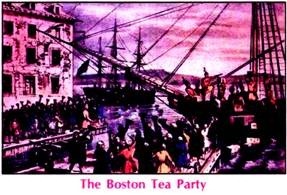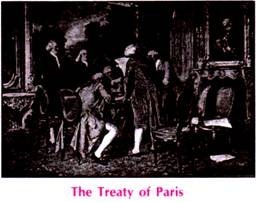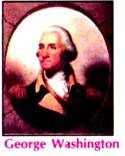The American war of Independence!
In the history of modern world, the American War of Independence (1776) occupies a very important place. It marks the beginning of the revolutionary period in the world.
The Americans were the first to revolt against the tyranny and selfish policies of imperial Britain. This roused hopes and aspirations among all nations seeking liberty and freedom.
In the 17th century, France, Holland, Spain and England had established their respective colonies in North America.
ADVERTISEMENTS:
By the mid-eighteenth century, people from Britain had settled and formed thirteen colonies along the Atlantic coast of North America.

Causes of the war:
Though these thirteen colonies enjoyed self- government in internal administration, trade and commerce were fully under the control of the British Parliament. Navigation Acts were passed giving Britain a practical monopoly over colonial commerce. No foreign vessel was allowed to enter a colonial port. Sugar, tobacco and ginger on their way to Europe had to pass through a British port, paying customs duties.
ADVERTISEMENTS:
The Molasses Act (1764) levied duties on molasses which the colonies brought home from outside. Moreover, it was illegal for the colonists to set up industries that could compete with British factories. One of the main grievances of the American colonists developed on account of the colonial trade policy of the mother- country.
To prevent smuggling, commanders of armed vessels stationed along the American coast were empowered to search any merchant ship approaching the colonial ports and seize it on the suspicion that it was carrying smuggled goods.
Britain’s participation in the European wars had exhausted her resources. The British Government felt that the colonists should share a part of their burden. So in 1765, the British Parliament passed the Stamp Act. The Stamp Act made it compulsory to affix stamps on all papers used in legal transactions.
It roused protests from the colonies. They proclaimed that there could be “no taxation without representation”. (The American colonists were not represented in the British Parliament.)
Alarmed by the open resistance in the colonies, the British Parliament repealed the Stamp Act in 1766. But the British Parliament also passed a Declaratory Act in 1767 asserting the authority of the British Parliament to tax the colonies.
In pursuance of this Act, duties were imposed on lead, glass, paint, tea and a few other articles imported into the colonies. In the face of a movement against taxation, the British Prime Minister repealed all duties except the one on tea.
This was an act of compromise, no doubt, but was also a confirmation of the right of the British Parliament to tax the colonies. The Government also wished to help the East India Company to dispose of its large stock of tea by selling it to the colonies.
The most famous of all the anti-British protests of the settlers is known in history as the “Boston Tea Party”. In 1773, a ship of the East India Company carrying tea reached the port of Boston in Massachusetts. A band of Boston citizens, disguised as Red Indians, boarded the vessel and threw the crates of tea into the sea. The ‘Boston Tea Party’, as the incident is called, resulted in open hostility between the settlers and the British Parliament. The British Government took retaliatory steps. They closed the port of Boston to all trade.
The beginning of the war:
Soon, the cause of Massachusetts was taken up by the other colonies. Opposition to British policy took on a national character. A colonial army was created and George Washington was chosen as the commander of the American forces. On 4 July 1776, the Declaration of Independence was issued.
The draft of the document was prepared by Thomas Jefferson. The Declaration said, “All men are created equal, that they are endowed by their Creator with certain inalienable rights that among these are Life, Liberty and the Pursuit of Happiness”. It also asserted the right of the people to form their own government. As the English government refused to respect these rights, the people started the War of Independence.
The English Commander surrendered to the colonial forces at Saratoga (1777). The victory of Saratoga prompted France to join the war in favour of the colonists. The French Government officially recognised American independence and declared war on Great Britain. The war ended in 1781 when the British forces under Lord Cornwallis surrendered. The British government did not make any further effort to reestablish its control over the George Washington colonies.
The War of Independence came to an end with the signing of the Peace Treaty of Paris (1783). Britain recognised the independence of its 13 colonies, which merged to form the United States. The new nation, endowed with a vast stretch of land stretching from the Atlantic Ocean to the Mississippi, soon became one of the greatest powers of the world. George Washington became the first President of the USA in 1789.
Results of the war:
1. The colonies became independent. The new nation was endowed with a vast stretch of land from the Atlantic Ocean to the Mississippi River and from the Great Lakes to Florida.
2. In 1789, the national government of the United States of America adopted a Republican Constitution. The Bill of Rights guaranteed to the citizens of the USA the right to freedom of speech, press, religion and justice. The American Government was to be headed by an elected President.
3. The American Revolution inspired men and women of other nations who wanted to be free from oppression. Thus it sowed the seeds of revolution, especially in France. It may be said that the American Revolution brought a great social and intellectual awakening among the people of Europe.
4. State interference in the country’s economy was minimized. The Government encouraged and supported private enterprises.



